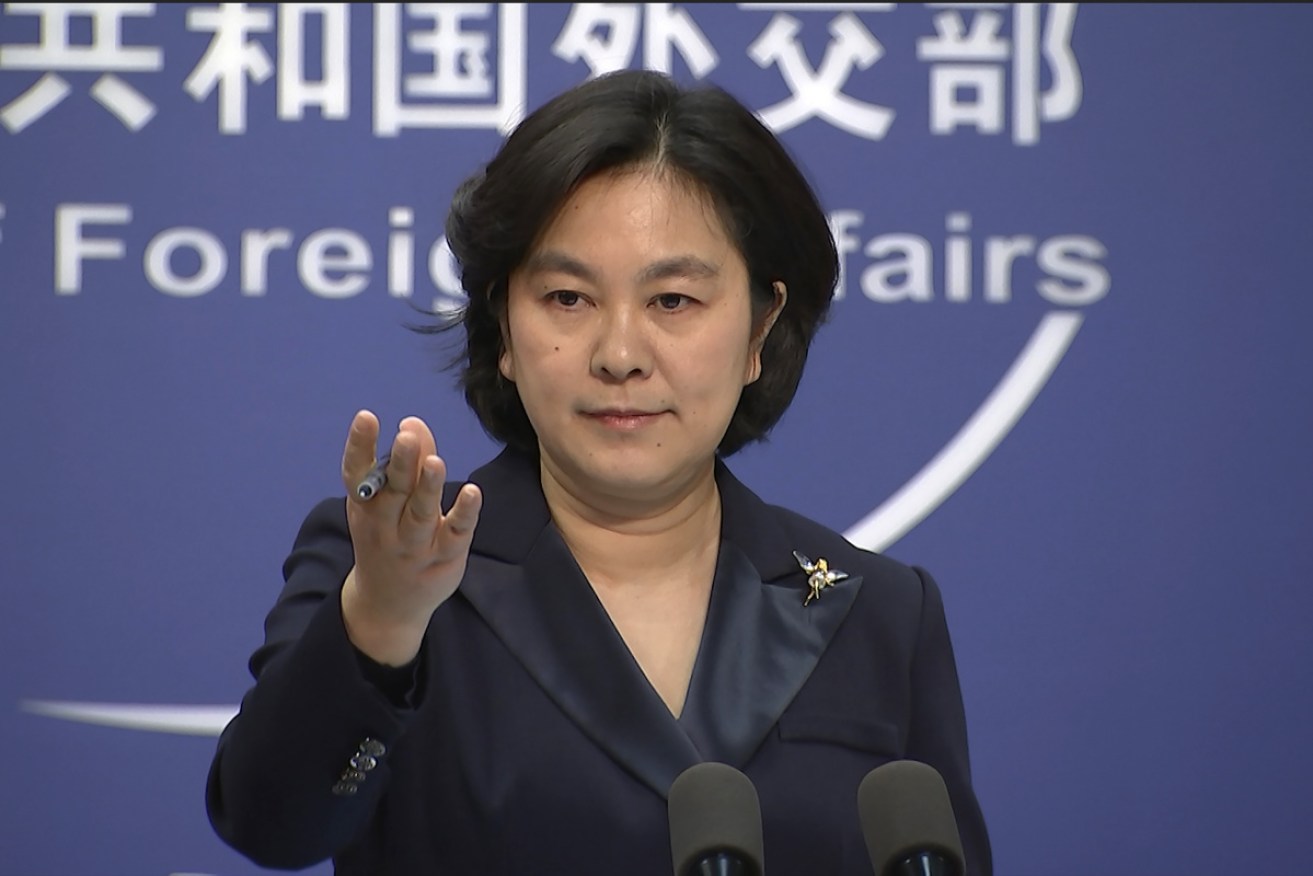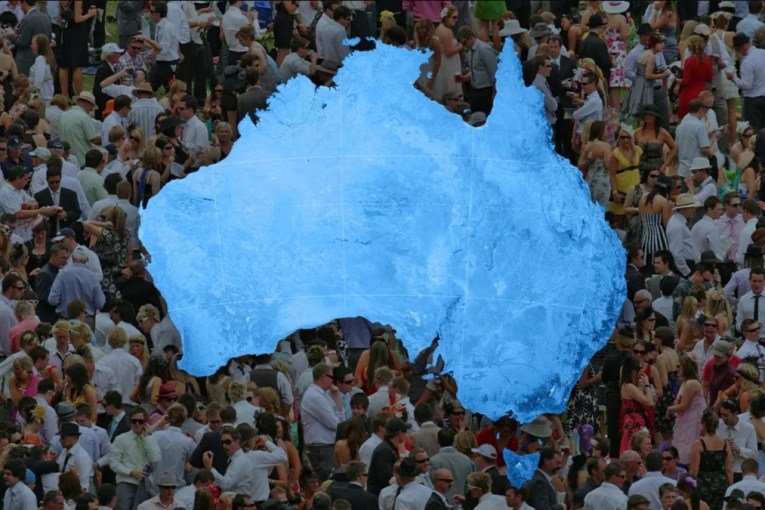Australian analysts hit back after China ‘genocide’ criticism


Chinese Foreign Ministry spokesperson Hua Chunying Photo: AAP
A leading Australian think tank has hit back at the Chinese government, after Beijing claimed evidence of genocide of Uyghurs in Xinjiang was a “fabrication”.
It’s the latest row in the ongoing tensions between the two countries, spurred on by unrest between China and the US.
“At no stage has the Chinese Ministry of Foreign Affairs addressed the detail of our work,” the Australian Strategic Policy Institute said, after Beijing criticised its analysts as part of its decision to bar Trump administration officials from China.

A sign describes this facility on the edge of Hotan, a city in Xinjiang, as a “concentrated transformation-through-education centre”. Photo: NYT
Nearly 30 former Trump allies including secretary of state Mike Pompeo, national security adviser John Bolton and campaign manager Steve Bannon were officially sanctioned by China’s government on Thursday, over their actions while in office.
The Chinese foreign ministry accused them of “hatred against China” and “crazy moves which have gravely interfered in China’s internal affairs, undermined China’s interests, offended the Chinese people, and seriously disrupted China-US relations”.
The sanctions include the officials and their family being barred from entering China, and from doing business with Chinese companies.
It came just a day after Mr Pompeo had branded China’s persecution of Uyghur Muslims in the Xinjiang region as “genocide and crimes against humanity”.
These acts are an affront to the Chinese people and to civilized nations everywhere. The People's Republic of China and the CCP must be held to account.
— Secretary Pompeo (@SecPompeo) January 19, 2021
The Canberra-based Australian Strategic Policy Institute (ASPI) – partially funded by the Australian and American governments – is among many organisations worldwide that has been tracking and reporting on the oppression of the Uyghur minority in the Xinjiang region.
Some one million Uyghurs are thought to have been put in detention or re-education camps since 2017, while ASPI research estimates around 80,000 have been forcibly moved around China to work in factories.
An ASPI data project, using satellite imagery, estimated 16,000 mosques in Xinjiang had been demolished or damaged “as a result of government policies” in recent years, with other sacred sites like shrines or cemeteries also razed. ASPI reports said that amounted to “cultural genocide”.
On Thursday, Chinese foreign ministry spokesperson Hua Chunying claimed Mr Pompeo’s claims of genocide were “venomous lies”, and blamed ASPI.

Mike Pompeo and other US officials have been barred from China. Photo: AAP
“All normal, rational people with a sober mind can draw conclusions based on facts. They should realise that Pompeo’s lies and rumours are based on the fabrications made by anti-China scholar Adrian Zenz and Australian Strategic Policy Institute,” Ms Hua said, according to a transcript on the Foreign Minister’s website.
Dr Zenz is a German academic whose research focuses on the Xinjiang camps.
“Their fellow countrymen in the United States and Australia have pointed out their lack of integrity, which brings shame to their home country,” Ms Hua continued.
In another response, she dismissed research into Xinjiang and Uyghur oppression as “rumours created by Adrian Zenz and the Australian Strategic Policy Institute, as well as their sponsors”.

ASPI satellite imagery captured huge detention complexes in Xinjiang. Photo: ASPI
In a response to The New Daily, an ASPI spokesperson backed the think tank’s exhaustive research.
“ASPI stands by the quality of its work on Xinjiang, which is based on careful analysis of Chinese language sources and satellite imagery,” the spokesperson said.
“Our work is highly regarded internationally, has been reported by media outlets globally, and is referred to by many governments and parliamentarians. At no stage has the Chinese Ministry of Foreign Affairs addressed the detail of our work.
“ASPI engages with all governments, and with all sides of politics, and will continue to do so.”
Australia criticised at UN review
It comes just a day after the Chinese government had also accused Australia of falling short on its human rights obligations.
Australia fronted the United Nations Human Rights Council this week, for a regular review.
About 30 countries raised issues with Australia’s human rights record, including on the age of criminal responsibility being just 10, and treatment of Indigenous people.
🇨🇳 CHINA today reviewed 🇦🇺 Australia's rights record at the UN:
"1: Combat racism & protect minorities. 2: Close migrant detention centers. 3: Investigate Australian war crimes. 4: Eliminate systematic discrimination. 5: Stop making baseless charges for political purposes." pic.twitter.com/Li37evwdY4
— UN Watch (@UNWatch) January 20, 2021
China’s representatives levelled direct criticism at Australia, with an official warning to the federal government to “stop using false information to make baseless charges against other countries for political purposes”.
Other countries called for Australia to ensure it fully investigated allegations of war crimes by SAS troops in Afghanistan.
Human Rights Watch Australia director Elaine Pearson said the government had received legitimate criticism.
UN member countries rightly criticised Australia’s treatment of asylum seekers and questioned why incarceration rates of First Nations people remain so high, Ms Pearson said.
“The UN review made it clear that the Australian government hasn’t followed through on some of its key past pledges to the UN Human Rights Council.”
Amnesty International said Australia’s human rights record had been found “seriously lacking in its commitments to international human rights law”.
Amnesty called for the age of criminal responsibility to be raised to 14, and for the federal government to move faster in having refugees resettled in the community or in third countries.








